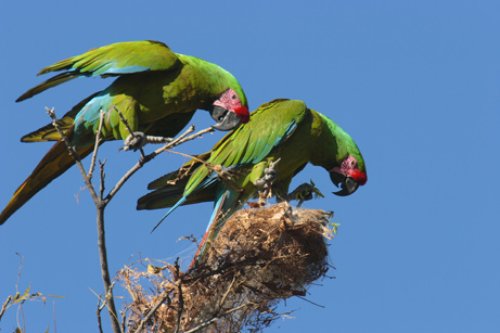 A newly announced ban on all parrot sales in Mexico may keep the country's rare exotic birds (above, military macaws in Sierra de Tamaulipas, Mexico) from dying during clandestine smuggling operations, conservationists say. Photograph by George Grall/NGS
A newly announced ban on all parrot sales in Mexico may keep the country's rare exotic birds (above, military macaws in Sierra de Tamaulipas, Mexico) from dying during clandestine smuggling operations, conservationists say. Photograph by George Grall/NGS
A new permanent ban on parrot sales in Mexico may protect the country's exotic birds from a thriving illegal wildlife trade, conservationists say.
Mexico considers half of its 22 parrot species endangered, and all but two are protected by federal law.
But between 65,000 and 78,000 parrots and guacamayas—a bigger type of parrot—are captured illegally every year, and most of these birds die each year before reaching their intended buyers.
The government has been unable to control the clandestine capture and sale of the protected birds, environmentalists say.
The new ban—an amendment to Mexico's wildlife law—will eliminate the parrot and guacamaya market completely.
The law will go into effect when it is published in the official congressional diary, possibly by the end of October.
" … The whole trade is really a waste," said Juan Carlos Cantú Guzmán, director of programs for the conservation group Defenders of Wildlife Mexico, which published a report on the illegal parrot market in 2007 and supports the ban.
"Ninety percent of the bird species are in some category of risk, and most are in danger of extinction if nothing is done."
Legal or Illegal?
The Defenders of Wildlife Mexico report identified U.S. demand as a major driving force behind the illegal trade for some species, such as the yellow-naped parrot, which is found only in the Mexican state of Chiapas.
"In many cases, the destination of these birds are border cities like Tijuana and Ciudad Juárez to commercialize them in the United States," Javier Sosa, director of the wildlife program at Mexico's environmental protection agency, PROFEPA, said in an email.